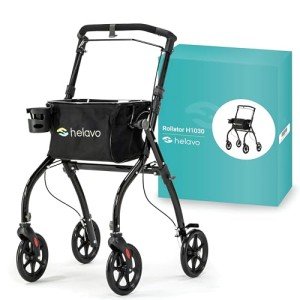Understanding the Four-Wheel Walker: A Comprehensive Guide
As individuals age or face health challenges, mobility can end up being a considerable issue. The four-wheel walker-- also called a rollator-- is designed to help those who need support while walking. This guide will delve into the advantages, features, and types of four-wheel walkers, supplying important details for individuals, caregivers, and healthcare specialists.
What is a Four-Wheel Walker?
A four-wheel walker is a mobility aid that features four wheels, hand brakes, a seat, and frequently a storage compartment. Unlike standard walkers that need users to raise them with each step, four-wheel walkers permit smooth motion and offer extra support for people who may struggle with balance or endurance while walking.
Key Features of a Four-Wheel Walker
| Function | Description |
|---|---|
| Wheels | Typically features four wheels for improved mobility. |
| Brakes | Hand-operated brakes for added control and safety. |
| Seat | An integrated seat enables users to rest when required. |
| Storage | Typically consists of a storage pouch or basket for individual items. |
| Height Adjustability | Can be adapted to fit the user's height for convenience and ease of usage. |
Advantages of Using a Four-Wheel Walker
1. Enhanced Mobility
Among the main advantages of a four-wheel walker is the increased mobility it uses. Mobility Assistance can navigate through indoor and outdoor areas easily, thanks to the rolling wheels. This mobility motivates physical activity, which is vital for preserving general health.
2. Safety and Stability
Four-wheel walkers come equipped with sturdy frames and reliable braking systems. This design promotes safety, particularly for people with balance issues, guaranteeing they feel secure while walking.
3. Convenience Features
With the addition of a seat and ergonomic deals with, four-wheel walkers offer comfort throughout use. Users can take breaks whenever required, which is specifically useful for those who tire quickly.
4. Adaptability
These walkers can be utilized in different settings, consisting of in your home, in public areas, and outdoors. Many designs are designed to be lightweight and foldable, making them easy to transport.
Kinds Of Four-Wheel Walkers
Not all four-wheel walkers are created equal, and a number of variations accommodate particular needs and preferences. Below is a list of different types of four-wheel walkers:
1. Standard Rollators
Requirement rollators are the most typical type, including basic designs with four wheels, hand brakes, and a seat. They are ideal for everyday usage, supplying necessary support for walking.
2. Heavy-Duty Rollators
These walkers are created for users with greater weight-bearing requirements. Heavy-duty rollators have strengthened frames and broader seats, accommodating larger people while providing the exact same mobility and support.
3. Lightweight Rollators
Ideal for those who take a trip often, lightweight rollators are compact and easily foldable. They are hassle-free for transport and are typically easier for users to maneuver.
4. Rollators with Specialized Features
Some rollators feature distinct features, such as integrated LED lights for night usage, baskets developed for bring bigger products, or boosted suspension systems for improved convenience on uneven surfaces.
How to Choose the Right Four-Wheel Walker
Selecting the best four-wheel walker requires factor to consider of numerous aspects. Here's a checklist to assist you:
1. User's Weight and Height
- Guarantee the walker can support the user's weight.
- Select an adjustable model that accommodates the user's height for comfortable use.
2. Intended Use
- Consider where the walker will mostly be utilized: inside your home, outdoors, or both.
- Search for designs with bigger wheels for much better performance on outdoor surfaces.
3. Convenience Features
- Evaluate the seat height and comfort level.
- Inspect for extra features, such as padded deals with, for enhanced functionality.
4. Storage Needs
- Figure out if the user needs a storage pouch or basket for carrying individual valuables.
5. Spending plan
- Assess the costs, remembering that rates can vary commonly depending on the features and brand.
Often Asked Questions (FAQ)
Q1: Are four-wheel walkers ideal for any ages?
A: While the majority of frequently used by older adults, four-wheel walkers can benefit individuals of any ages who have mobility difficulties due to injury, surgery, or health conditions.
Q2: How do you keep a four-wheel walker?
A: Regularly inspect the wheels for particles, ensure the brakes work properly, and periodically tidy the walker with mild soap and water to keep it in great working order.
Q3: Can I utilize a four-wheel walker outdoors?
A: Yes, numerous four-wheel walkers are created for both indoor and outdoor use. Nevertheless, choosing a model with bigger, durable wheels is recommended for uneven surfaces.
Q4: Do insurance coverage plans cover the expense of four-wheel walkers?
A: Coverage varies by insurance plan. It's best to seek advice from with your service provider concerning coverage for mobility help.
Q5: How do I learn to use a four-wheel walker effectively?
A: It may be beneficial to work with a physiotherapist or healthcare professional to find out how to utilize a four-wheel walker securely and successfully.
Four-wheel walkers act as valuable mobility help for those who require additional support while walking. By comprehending their features, advantages, and types, users and caregivers can select the ideal design to enhance mobility and keep self-reliance. As mobility difficulties occur, it's comforting to understand that tools like four-wheel walkers can substantially enhance quality of life and promote a more active lifestyle.

